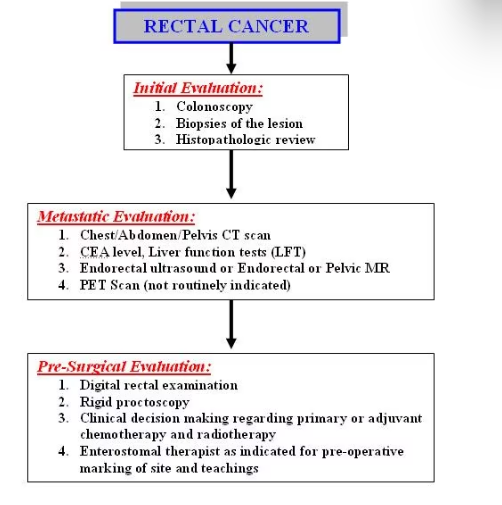Case Presentation: The patient is a 52-year-old male with a history of HIV (on antiretroviral therapy), ulcerative colitis, untreated hepatitis C who presented to the hospital after several weeks of difficulty passing stools, tenesmus, and rectal pain. This was originally attributed to hemorrhoids several weeks prior to presentation, but after symptoms progressed, the patient presented again to the ER. On admission, the patient was febrile to 101.3 degrees F, tachycardic to 124, normotensive, with normal respiratory effort and oxygenation saturation on 2L NC. He was admitted and underwent CT imaging of abdomen with contrast which showed a large rectal mass and lesions in the lung and liver suggestive of metastatic disease. Colonoscopy confirmed a fungating, infiltrative, and ulcerated partially obstructing rectal mass of 5 cm. Subsequent biopsy was taken that revealed necrotic, poorly differentiated carcinoma, consistent with high grade neuroendocrine tumor, with a remarkably high ki67 score of 90%. He was discharged with outpatient follow up scheduled with oncology, however, he returned to different institution complaining of worsening rectal pain, abdominal pain, lethargy, and malaise. He underwent inpatient US-guided liver biopsy by IR which again confirming small cell carcinoma. In this admission however, both medical and radiation oncology were consulted and proceeded with inpatient palliative radiation therapy on the rectal mass and initial chemotherapy with carboplatin and etoposide. Meanwhile, surgical oncology was consulted, with decision to defer surgery pending chemoradiation therapy. He was discharged with full functional capacity for follow-up with his outpatient oncologist, pending subsequent cycles of carboplatin and etoposide as well as consideration of adjuvant immunotherapy.
Discussion: Small cell carcinoma most commonly presents in the central airway; colorectal small cell carcinoma is an extremely rare and aggressive tumor that carries a poor prognosis(1). New developments in immunotherapy agents, particularly in combination with commonly used platinum-based chemotherapy regimens, have shown considerable promise, and may be an important area of study for future oncologic hospitalists(3,4). This case highlights several shortcomings in the current understanding of the treatment of colorectal SCC, such as the paucity of data on whether there is survival benefit to initiation of treatment while inpatient, or the role and timing of surgery and radiation in disease treatment. Moreover, given our patient’s significant medical history, this case highlights how the hospitalist may be essential in managing multiple, complex conditions which may have significant implications in immunodeficient patients receiving active radiation or chemotherapy inpatient.
Conclusions: Small-cell carcinomas (SCC) are malignancies of neuroendocrine origin. Colorectal SCC is an extremely rare cancer and its incidence is reportedly less than 0.2% among all kinds of colorectal cancers (1). Small-cell neuroendocrine carcinoma has been reported to occur frequently with distant metastases and is an aggressive neoplasm traditionally carrying a poor prognosis, however, the advent of frontline treatment with combination chemoimmunotherapy shows promising results (2, 3). Hospitalists involved in the care of oncologic patient should be familiar with the inpatient management of advanced SCC, given primary SCC with neuroendocrine differentiation has been observed in many diverse sites.

